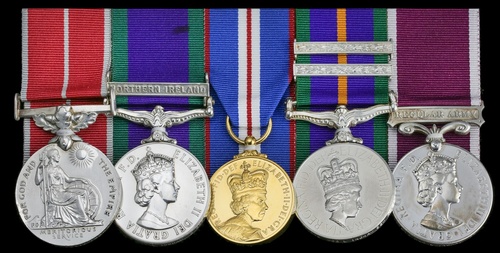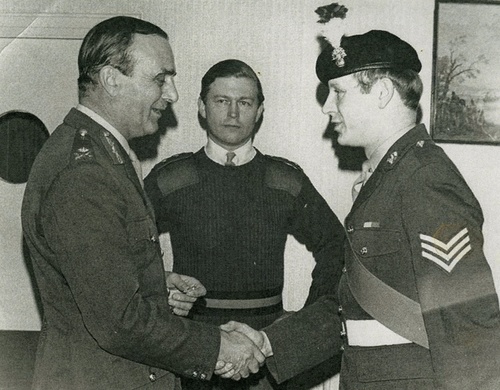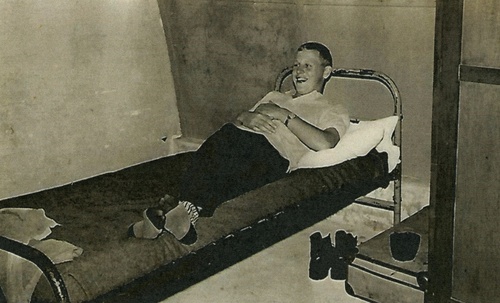Auction: 18002 - Orders, Decorations and Medals
Lot: 508
Sold by Order of the Recipient
'My operational area included New Lodge Area of north Belfast - centre of IRA activity - were I operated day and night under constant threat of sniping, ambush and nail bomb attack'
Ingham on the tour which earned him the B.E.M.
An early 'Northern Ireland' B.E.M. group of five to Major L. Ingham, Royal Regiment of Fusiliers
A talented Radio Operator and Telegraphist, Ingham took command of a Platoon at short notice and led it with distinction through the Troubles -his resultant B.E.M. was the first award bestowed upon the Battalion
Having joined the Army as a Junior Soldier, he left after 30 years' service having served in British Guiana, Hong Kong, Malaya, Northern Ireland and Germany, becoming an S.N.C.O. Instructor at Sandhurst
British Empire Medal, E.II.R. (23951416 Act. Sgt. Leslie Ingham, R.R.F.), officially impressed naming on pre-prepared ground; General Service 1962-2007, 1 clasp, Northern Ireland (23951416 Sgt. L. Ingham 2 RRF.); Jubilee 2002; Accumulated Campaign Service Medal, with 2 Bars (23951416 WO2 L Ingham BEM RRF); Army L.S. & G.C., E.II.R. (23951416 WO2 L Ingham BEM RRF), the first with minor edge bruise, generally good very fine (5)
B.E.M. London Gazette 30 October 1972.
'For distinguished services in Northern Ireland during the period 1 February - 30 April 1972.' The original citation states:
'Cpl. (Acting Sgt.) Ingham was required to assume command of 11 Platoon, A Company, 2 R.R.F. at very short notice in November 1971 to command it for the remainder of the Battalion's tour in Belfast until February 1972. His platoon continually displayed an above average ability and stability under fire which is a direct tribute to his single-mindedness, determination and enthusiasm which proved constant no matter however arduous the task or dangerous the situation.'
Leslie Ingham was born at Bury, Greater Manchester in September 1946. Educated at Bury Boys Grammar School, he played football for the school and joined the Lancashire Fusiliers A.C.F. at Castle Armoury. In late 1962, aged just 16, he enlisted at the Army Recruiting Office on Great Ducie Street in Manchester and became a Junior Soldier.
During the coldest winter since 1814, when temperatures dropped to -19.4°C, Ingham completed his infantry training at Junior Tradesman's Regiment, Troon, Ayrshire, Scotland. He excelled as a Radio Operator, achieving 22 words per minute in Morse Code and mastering several Telegraphic systems. He also gained Regimental colours in football and cross-country running. On graduating in 1964 he passed out as a Junior Regimental Sergeant Major, the highest rank achievable for a boy soldier.
Omnia audax
Stationed at Osnabruck since 1960 as part of the British Army of the Rhine, the Lancashire Fusiliers returned to England in early 1964. Ingham joined the 1st Battalion at Norton Barracks in Worcester, immediately entering its Signalling Platoon. On 11 January 1965, 1st Battalion embarked on a 9-month tour of British Guiana, establishing itself at the Lennora Sugar Plantation outside the colony's capital Georgetown. Britain had declared a State of Emergency in the colony in 1953, following the rise of the Communist People's Progressive Party. A constitutional convention held in London in 1960 had tried to hamper the P.P.P.'s progress by introducing Proportional Representation to Georgetown's Parliament. The British Army was charged with enforcing the new settlement and suppressing riots. During the tour, Ingham was promoted to Corporal and given command of the Signalling Platoon.
The 1st Battalion ended its tour in November, and moved to Weeton Camp in Blackpool. Ingham was sent to Chalfont St. Peter, Buckinghamshire for a 16mm Projectionist course run by the Army Kinema Corporation, quickly becoming an expert on Bell & Howell and Debrie Projectors. The Battalion flew to Hong Kong on 26 September 1967, Ingham celebrating his 21st Birthday during the flight. He was stationed with 'A' Company at Erskine Camp with the rank of Acting Platoon Sergeant, understudying Sergeant Kiwi Johnson.
On St. George's Day 1968, the Lancashire Fusiliers were renamed the 4th Battalion, Royal Regiment of Fusiliers. It was a sad day for the regiment, but amalgamation was necessary to preserve the Fusilier name. As the regiment formed up for its traditional parade, its distinctive 'Primrose' Hackles were removed from berets and replaced by the red-over-white Hackle of the new Royal Regiment of Fusiliers. The spirit of the former regiment continued, its Latin motto 'Dare Anything' losing none of its relevance.
Ingham missed the St. George's Day Parade, having been posted with an advance party to Jungle Warfare School, Kota Tinggi, Malaya. Ingham's platoon took part in 'Minden Rose', an exercise in which Company-sized groups rotated through pre-arranged jungle training packages for a short period prior to returning to Hong Kong.
The withdrawal of American troops from Vietnam began in 1969, Hong Kong becoming a Rest & Recuperation centre for exhausted U.S. personnel. Ingham remembered seeing the massive Aircraft Carrier U.S.S. Enterprise sailing into Victoria Harbour, doubling the price of everything in Hong Kong! The China Fleet Club became the only sensible 'watering hole' left to the Fusiliers. Many stories abound of the Lancashire friendship offered to visiting GI's to help them spend their hard-earned dollars.
Northern Ireland - B.E.M.
Returned to Weeton Camp in July 1969, the Battalion were readed for disbandment, with Ingham absorbed into 2nd Battalion, Royal Regiment of Fusiliers. Ingham was interviewed the day he arrived, and the next day was rapidly posted to 2nd Battalion, The Queen's Regiment for service in Northern Ireland. The Troubles had begun.
Ingham joined The Queen's Regiment at Palace Barracks, Belfast and assumed the role of Signalling Platoon Sergeant. His introduction to civil disturbances was at Brown's Square, Lower Shankill. This incident led to Operation Banner, the British Army's response, which did not officially end until 31 July 2007.
Ingham left Northern Ireland in October and returned to 2nd Battalion, Royal Regiment of Fusiliers at Catterick as Acting Sergeant with 'C' Company. On 21 July 1971 the Battalion undertook a brief tour of Berlin, but by September it too was stationed in Belfast. His subsequent B.E.M. was the first award bestowed upon the Battalion and was presented by General Sir M. Gow. He undertook two further tours of Northern Ireland in July-September 1972 and June-October 1973 on each occasion serving as Platoon Commander.
Sandhurst
From 7 January 1974, Ingham attended the Pre-selection Senior N.C.O.'s course at Royal Military Academy, Sandhurst. A gruelling 6 weeks of tactical assessment, teaching practices, weapon training and arms drill followed, with a final overseas exercise in Cyprus. Ingham passed the course and became a S.N.C.O. Instructor, gaining many friends throughout the Army. He took part in the presentation of Colours to R.M.A.S. by Her Majesty the Queen on 30 May, and remained at Sandhurst for a year.
Germany and the Falklands
In August 1975 Ingham returned to 2nd Battalion, Royal Regiment of Fusiliers as W.O.2 Company Commander, 'A' Company. Stationed at Paderborn in Germany, the Battalion again toured Northern Ireland, this time the county of Armagh (June-September 1976). He attended the Presentation of New Colours to 6th Battalion at Alnwick Castle by H.R.H. the Duke of Kent, the Regiment's Colonel-in-Chief.
He would be appointed Regimental Quartermaster Sergeant in November 1979 and Regimental Sergeant Major, April 1981. Ingham was stationed in Berlin with the 2nd Battalion until July 1983. 'A' Company, with Ingham 2nd-in-Command were posted to Goose Green in November as part of the British Quick Reaction Force, in readiness for any Argentine counter-attack.
Officer
In April 1984, having been granted a Short Service Commission, Ingham transferred to the 3rd (Armoured) Battalion, Royal Anglian Regiment as Minden Major (Quartermaster). He held this post until March 1987, when he became Malone Major (Quartermaster) of the 7th Battalion, Royal Irish Regiment. Two years later he advanced to Thiepval Major, a staff posting in the Headquarters of the 39th Infantry Brigade that entailed full responsibility over military works in West Belfast.
Finally, in August 1991, Ingham returned to his old Regiment. He commanded HQ Company of the 2nd Battalion, Royal Regiment of Fusiliers and retired in November 1992. He remained part of the Regimental family for many years and can be seen in numerous photographs, stubbornly wearing the old 'Primrose' Hackle of the Lancashire Fusiliers.
Sold together with four original annotated photographs.
http://www.lancs-fusiliers.co.uk/feature/Les%20Ingham/Les_Ingham.htm
Subject to 20% VAT on Buyer’s Premium. For more information please view Terms and Conditions for Buyers.
Sold for
£1,600









